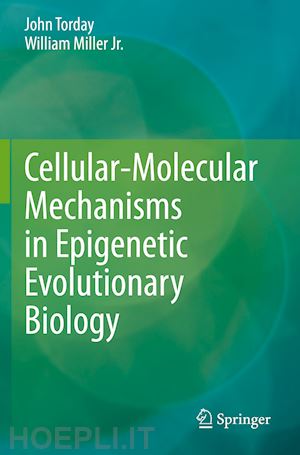
Questo prodotto usufruisce delle SPEDIZIONI GRATIS
selezionando l'opzione Corriere Veloce in fase di ordine.
Pagabile anche con Carta della cultura giovani e del merito, 18App Bonus Cultura e Carta del Docente
There has been no mechanistic explanation for evolutionary change consistent with phylogeny in the 150 years since the publication of ‘Origins’. As a result, progress in the field of evolutionary biology has stagnated, relying on descriptive observations and genetic associations rather testable scientific measures.
This book illuminates the need for a larger evolutionary-based platform for biology. Like physics and chemistry, biology needs a central theory in order to frame the questions that arise, the way hypotheses are tested, and how to interpret the data in the context of a continuum.The reduction of biology to its self-referential, self-organized properties provides the opportunity to recognize the continuum from the Singularity/Big Bang to Consciousness based on cell-cell communication for homeostasis.
Chapter 1. Introduction
Chapter 2. Darwin, the Modern Synthesis, and a New Biology
Chapter 3. Cognition and the living condition
Chapter 4. What is consciousness? An Evolutionary Perspective
Chapter 5. Networking from the Cell to Quantum Mechanics as Consciousness
Chapter 6. The Nature of information and its communication
Chapter 7. The information cycle and biological information management
Chapter 8. Communication and the accumulation of genetic information
Chapter 9. Non-genic means of information reception and exchange
Chapter 10. The primacy of the unicellular state
Chapter 11. Phenotype, niche construction and natural cellular engineering
Chapter 12. Holobionts
Chapter 13. Four Domains: Cognition-based evolution
Chapter 14. Reconciling physics and biology
Chapter 15. What does this mean for evolution?
Chapter 16. Conclusion: Cellular-molecular evolution in the 21st century
John S. Torday, MSc, PhD received his B.A. in Biology/English from Boston University (1968); MSc (1971) in Investigative Medicine, and PhD (1974) in Experimental Medicine from McGill University; Post-Doctoral Fellowship in Reproductive Biology, University of Wisconsin-Madison (1976). He has held Faculty positions in the Departments of Pediatrics and Physiology, Harvard Medical School (1976-91); the Departments of Pediatrics and Gynecology, University of Maryland Medical School (1991-98); the Departments of Pediatrics and Obstetrics and Gynecology, and Evolutionary Medicine, the University of California- Los Angeles (1991- present). He is a member of numerous scientific societies, and is a Fellow of the European Academy of Sciences and Arts (2018- present).
William B. Miller Jr, M.D. attended an Honors Program in Northwestern University, graduating with a B.S. in Medicine (1973) and a Doctor of Medicine (1975). He is a member of Alpha Omega Alpha, a medical honor society. Dr. Miller was on the faculty of Pennsylvania State University in the Department of Diagnostic Radiology as an Asst. Clinical Professor of Diagnostic Radiology for 10 years and was in the private practice of Diagnostic Radiology for over 30 years. It was during that period that several clinical observations spurred his interest in genetics, evolutionary biology and the microbiome, leading to the publication of The Microcosm Within, Evolution and Extinction in the Hologenome in 2013. This led to his fortuitous collaboration with Dr. Torday and a series of nearly two dozen articles on evolutionary biology and the influence of the microbiome on biological development.











Il sito utilizza cookie ed altri strumenti di tracciamento che raccolgono informazioni dal dispositivo dell’utente. Oltre ai cookie tecnici ed analitici aggregati, strettamente necessari per il funzionamento di questo sito web, previo consenso dell’utente possono essere installati cookie di profilazione e marketing e cookie dei social media. Cliccando su “Accetto tutti i cookie” saranno attivate tutte le categorie di cookie. Per accettare solo deterninate categorie di cookie, cliccare invece su “Impostazioni cookie”. Chiudendo il banner o continuando a navigare saranno installati solo cookie tecnici. Per maggiori dettagli, consultare la Cookie Policy.